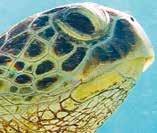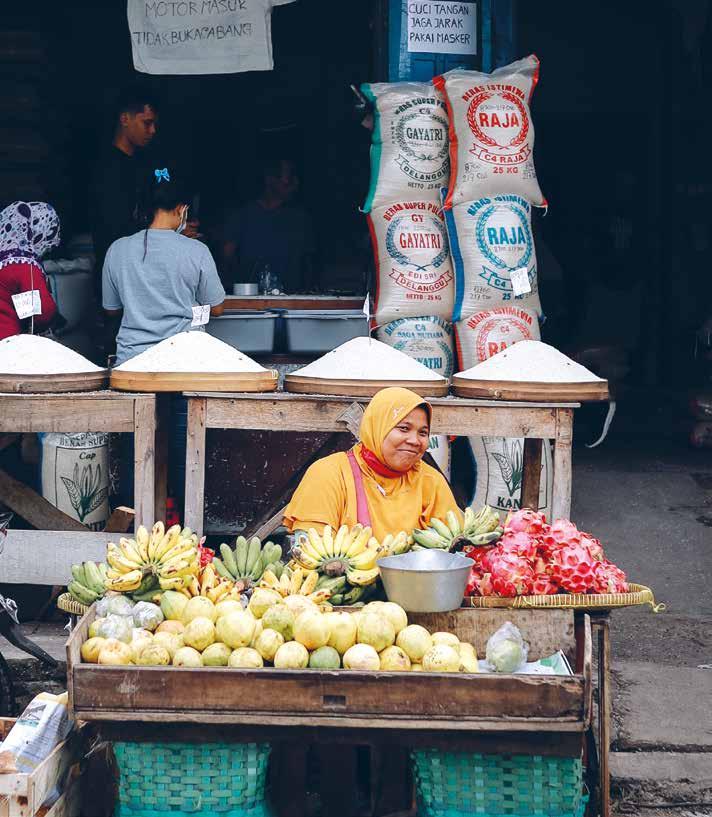The Explorer
Brave New World
Top trips for solo travellers ± Family adventures in Thailand
Spotlight on Belize ± Walking holidays for beginners




Brave New World
Top trips for solo travellers ± Family adventures in Thailand
Spotlight on Belize ± Walking holidays for beginners



Another winter draws to a close – I just love the change in seasons – and I especially love it when that coincides with the launch of brand new trips!
Despite decades of travelling, living overseas and working in the travel industry, there are always new places I want to visit. For 2024 we’re bringing back Kenya, which is a magnificent country, and introducing Tunisia, which looks incredible and has now taken up a firm spot on my wishlist. Check out some of our favourite new additions on pages 18-19.
In this issue of The Explorer, we learn about the benefits of joining a small group as a solo traveller – around half of our travellers are joining our trips solo, so I’m sure this will strike a chord with many. And Emma Thomson writes about the beauty and the restorative power of nature.
It’s been a joy putting together our favourite travel stories for you. We hope you enjoy planning your 2024 adventures as much as we do.
Edwards Managing Director,
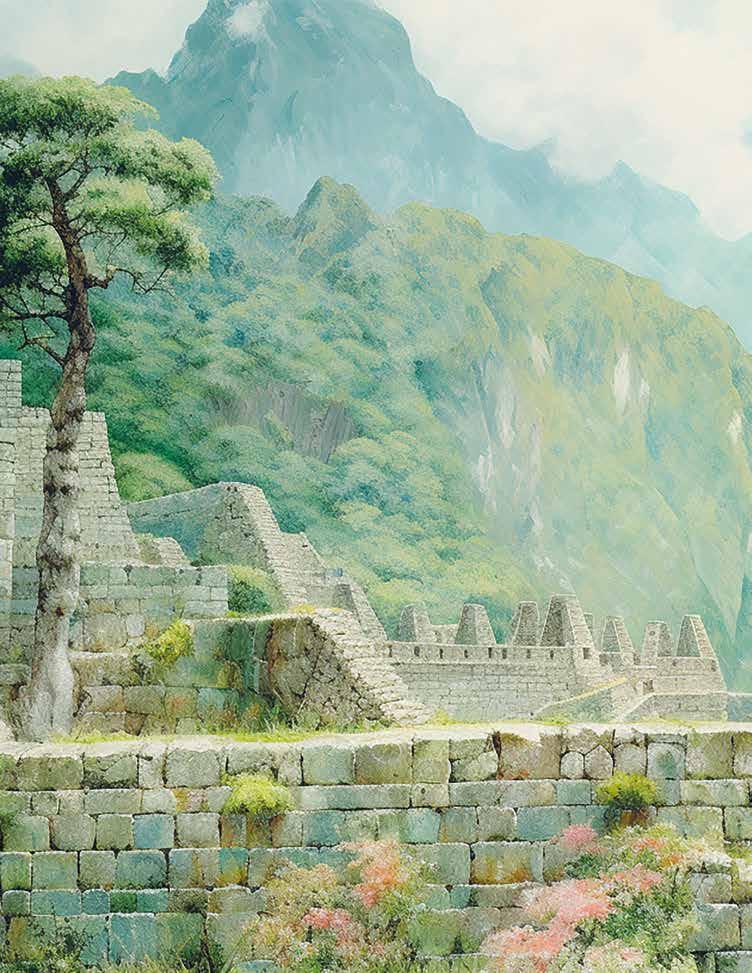
Just imagine... How might Van Gogh have painted the Taj Mahal? Picasso the Pyramids of Giza? Or Klimt the Amalfi Coast? Using some clever AI technology, we found out.
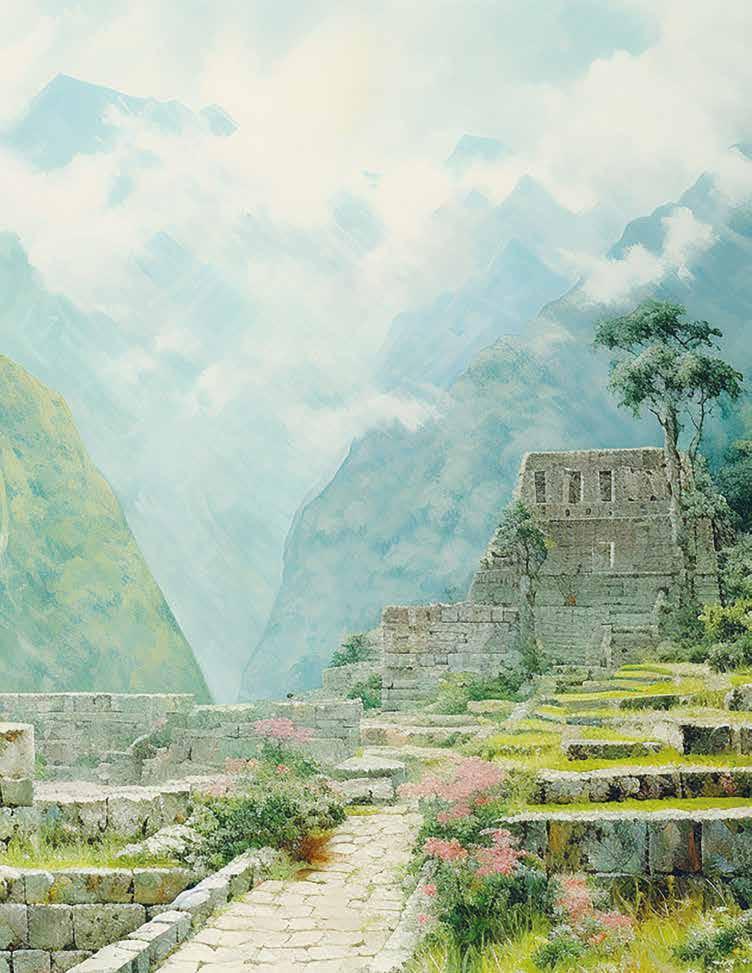 Words –– Laura Dewar
Words –– Laura Dewar
Throughout history, art has had the power to ignite our longing for adventure. Masterpieces like Monet’s landscapes have a way of calling us to step into those very scenes.
At Explore we’ve seen how the expression of the world on canvas sparks wanderlust. Curious, we used an AI tool to embark on an imaginative journey, creating an original gallery of incredible images which show how famous artists might have captured iconic locations around the world in their distinctive and iconic styles.
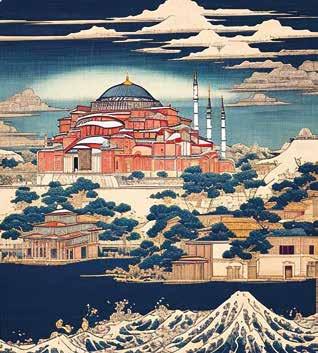

“The landscape subject and the artist style are both familiar, but their combination helps us see places we know in a completely new and exciting way! It’s inspiring.”
You’ll find more examples of popular locations reimagined in famous art styles in our gallery online. Visit exploreworldwide.com.au/AI-destinations


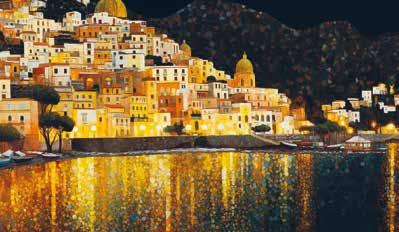

“There’s always been a captivating dance between art and travel. We’re inspired to capture the scenes around us, whether it’s on our phone, camera, or sketchpad.”1. Machu Picchu as imagined in Monet’s style 2. A Van Gogh imagining of the Taj Mahal 3. The Hagia Sophia in the style of Hokusai 4. Amalfi Coast as imagined in the style of Gustav Klimt 5. Pyramids of Giza in the style of Picasso 6. An L.S. Lowry imagining of Kyoto, Japan

Taryn Ponte honeymooned in Thailand. Returning years later with her husband and teenagers, the magic was still there, just with more adventure and extra chilli.

We moved to the UK from Australia six years ago with a mission to travel more. Thailand was high on the list – my husband and I had always wanted to take the boys to our special place. We’re an active family; my three teens (age 17, and 15-year-old twins) miss the sea and sun back home, and we’re all huge fans of Thai food so we quickly agreed on this trip!

The trip we’d chosen started in Bangkok, moving to an overnight camp at the Khao Sam Roi Yort National Park, and onto a resort in Kui Buri, via the Phraya Nakhon Caves. Next was a stay in the Khao Sok National Park with guided jungle walks. The final stop was a beach hotel near Phuket. I knew they’d love it, of course, but what I wasn’t prepared for was how much more there was to a country I had already committed to heart. We knew Thailand as a place with vibrant cities, and a stunning beach life. Our trip unlocked much, much more. The diversity of the jungle, the forests, the wildlife. And with a Tour Leader who allowed us to be daring and challenge ourselves under his careful watch.
Bangkok was everything I remembered. Our Tour Leader Pok took us into town via the back streets for our first dinner out and we then walked along Khao San Road, the backpackers’ centre – people everywhere, lights and colours, music blasting, pushcarts of freshly fried insects (apparently a rite of passage) – we tried salted crickets, but I refused the scorpions and spiders (I am an Aussie after all!).
The trip was full of surprises from the start. On our second day we headed out to the famous Muay Thai training camp where we got to watch some professional boxers training for a competition. Our family boxing session was amazing –I worried that it might not be for me, but I loved it! Muay Thai boxing is more of a dance form – taking place in the traditional space with the ring rope.

Our first introduction to the importance of Thailand’s eco-system was at the Khao Sam Roi Yort National Park where we were shown the biodiversity of the mangrove forests by our knowledgeable rangers, who also doubled up as our chefs for the night, cooking the most incredible meal that became our food highlight of the trip. Which is saying something, as the whole food experience of the holiday was everything we wanted, and more.
We’re a foodie family and adventurous with flavour, especially heat. Thailand did not disappoint. We were like kids in a sweet shop at the local markets, choosing mango, nuts, spices, and chilli powder to bring home. Visiting a floating market, we got to try the most delicious coconut ice cream served in half a coconut husk – it was a gelato style ice mixed with sticky rice and topped with an orchid. We made sure we waited until it floated past again for a second taste! I also bought a huge wok (it was a bit of a squeeze to get into our suitcase, but I was determined).
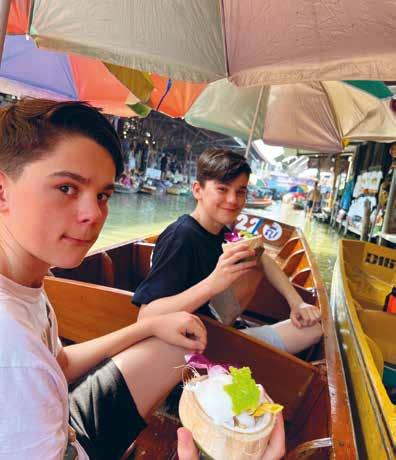
By this stage, Pok realised how much I loved to cook, so shared some of his traditional Thai recipes for me to try back home. Our meals were always authentic local Thai dishes from family run places. Fresh, zingy and zesty, with options to add more chilli. We feasted on minced chicken, green curry, sticky rice, salads, and morning glories in oyster sauce and garlic. Simple, salty, sweet and sour. We were in heaven.
Food aside, our most memorable day was the climb to the Phraya Nakhon Caves. Pok took us out early to avoid what would become a very hot day. The ascent was steep but the effort was more than worth it. I can’t even begin to describe the enormity of the height and size of the cave. It felt like we were on a movie set – it was one of those wow moments. I’m claustrophobic and had been anxious about this challenge, but the cave opened up to let in such light I didn’t feel hemmed in at all. You felt hugged by the beauty of the walls and then the way the light hits the pagoda in the middle… well, we were in awe – all five of us. Our legs were shaky on the dramatic descent but the ice cream at the bottom, and the sense of shared achievement felt good.
‘I got this recipe from our fab Tour Leader, Pok. I use the wok I bought from a local market while we were on our trip. This dish has become a firm favourite with my teenagers. As for quantities, cooking is more an art than a science here, so add ingredients liberally and adjust to taste!’
1. Roast sticky rice in a pan, then use a pestle and mortar to crush into a nutty powder.
2. Boil a small amount of water in a wok, then add chicken mince to poach it.
3. Add ginger, fish sauce, lime juice, chilli powder and coriander, and toss.
4. Finally add the roasted rice powder –scoop into lettuce cups or add to vermicelli noodles.

The biggest surprise of all? The wildlife. From the giant monitor lizards to the family of elephants we were privileged to see from our vehicle on our trek through the protected Kui Buri National Park. And our guided jungle walk in Khao Sok was something else. Our jungle leader, Por, was brilliant and captivated the boys, turning bamboo sticks into musical instruments for them, and teasing out a huge trap door spider from an ant hole. Then, as we cooled off with a swim in the crystal-clear waters of the river, we heard a rustle –and looked up to see a troop of gibbons – 40 of them, swinging and jumping through the trees above us – adults black, babies bright orange – just a few metres over our heads. We felt like we were in an episode of a David Attenborough programme! Definitely one for the memory bank.
And in amongst the action sat perfectly timed beach days. In fact, the whole pace of the trip suited us. Family time is sacred – but planning the logistics, the transport, the meals, the activities – when you do it yourself it’s a big deal. When someone else does it for you, and does it this well, it’s a gift. Our trip ticked every box. All the adventure, all the precious quality time, all the river swims, all the meals, without the stress – holiday gold for parents. Pok gave me peace of mind on many levels. His eyes were watching everything, enabling my boys to discover freely in a safe environment, and enabling me as their mother to relax, and be in the moment. And what a moment it was.
Would you like to take your family on an adventure to Thailand?
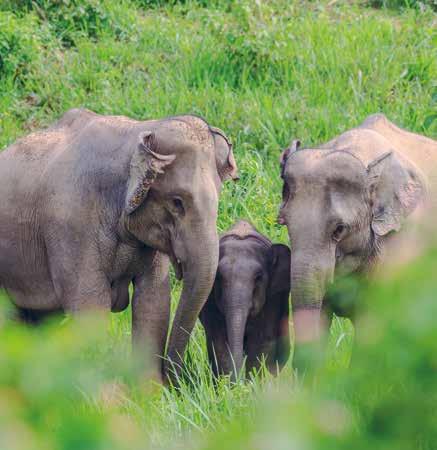
exploreworldwide.com.au/FTT
1
Long haul travel
Keep it simple. Sleep on the plane when you can. When you arrive, get some sunshine, have an active first day, and then get everyone off to bed early.
2
An annual trip is non-negotiable
As the kids grow in independence, we see less of them. Holidays are guaranteed family time together.
3
Get someone else to plan the logistics
Ditch the tension and niggles that often occur when you’re working out what to do on that perfect family break. It’s your holiday too.
4
Choose some experiences they’re not expecting Our Thai boxing session was something the boys (and I) may not have chosen to do – but it was a brilliant experience for all of us.
5
Join in with the challenges
My sons really enjoy that I get involved and experience what they are experiencing. Try and be in the moment.
6
Car/bus journeys have value too Rather than avoid time on the road, it can be a great way to reset. Quiet, cool, a break from the sun, time-out, and a chance to switch off.
7
What screen time?
My boys didn’t have an international SIM, so only used phones for taking pictures during the day. All hotels had Wi-Fi, so they had screen time in the evenings.
8
Easy accommodation
Choose a place to stay that is relaxed and simple. Teens don’t want fussy rules or a formal vibe.
Sri Lanka is a firm favourite for many when it comes to vegetarian and vegan cuisine. Most dishes are homemade, using locally sourced, seasonal ingredients, such as Sri Lankan hoppers (rice flour pancakes) served with curries or spicy vegan sambal. On our Active Sri Lanka trip, you’ll get to pick your vegetables of choice in an organic garden and they’ll then be cooked up by local chef Thusitha.
From nourishing bean stews to spicy pancakes, there’s a huge plethora of vegetarian dishes to be enjoyed around the world. Time to take your taste buds on tour.
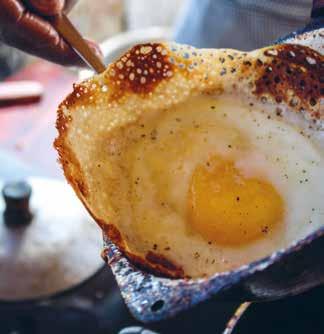
Around 40% of India’s population is vegetarian, so it’s no wonder that menus here are teeming with veggie options. Breakfast dosas (thin lentil-based pancakes served with potato curry) or palak paneer (Indian cheese in a pureed spinach with spices) are two popular choices. There’s also a wide variety of dals (lentil curries) that are especially good at the end of a long day exploring.
The souks of Lebanon are abundant with authentic meze dishes for you to try. These small dishes, traditionally served as appetisers, often feature vegetable bases, and are accompanied by warm, fresh flatbreads. Think hearty lentil soups, tangy salads, grilled halloumi, and, of course, hummus. Vegetarian meze dishes are available in almost every restaurant in Lebanon, so you’ll be spoilt for choice.
Many dishes on offer in Peru are packed with vegetarian superfood. There are over 4,000 varieties of potato grown in Peru, many of which can be enjoyed throughout your adventure. Elsewhere, fill up on purple corn, quinoa soup, and mushroom ceviche to keep you fuelled on your journey.
In this stunning corner of the world, you’ll find plenty of fresh vegetables, herbs, and spices – every meal packs a punch. Pho is a Vietnamese classic, featuring ginger, star anise, cardamom, and a variety of herbs and vegetables; a popular noodle soup guaranteed to tantalise the taste buds.
Did you know that Explore offers specific veggie departures in India? Have a look here exploreworldwide.com.au/XKB
“Avoiding meat when you’re travelling used to feel like mission impossible. But now it can lead to great adventures, with a real insight into your destination and its culture.”
Our travel goals have shifted since the pandemic. Forget luxury hotels and pampering spas, we’re opting to switch off and tune in to the natural world instead. Emma Thomson explores why.
Words –– Emma Thomson

n a blue-sky morning, my guide dropped me off on the far side of the Valahnúkur Mountains in southern Iceland. “I’ll see you back at the camping huts,” he said, gesturing toward the high summit that stood between me and the camp nestled on the other side. In the distance, snow-capped Eyjafjallajökull volcano loomed like an unearthly ogre. I watched as the Jeep rumbled back across the wide floodplain and out of sight, then turned to face the mountain. It was just Mother Nature and me now. Up here, not a speck of humanity could be seen, and the feeling of freedom was as keen as the fresh air that bit my wind-cherried nose. That heady dose of nature’s power was so peaceful, so profound, I can conjure every detail even though the hike was undertaken over a decade ago. I’m not alone. Google Travel Trends listed ‘Outdoor and Nature Destinations’ as their sixth most-popular search enquiry for 2023 and this has been reflected in Explore’s bookings. Since the pandemic ended, travellers are investing their money to immerse themselves in the cloud forests of Costa Rica (up 70%), spend time with the elephants in South Africa (up 169%), take photos of wildlife on the Galapagos (up 93%),
and pace barefoot across the serene sands of Morocco (up 100%).
Across the travel industry there’s been a spike in demand for no-frills nature-based holidays. We want to escape to the mountains, bathe in rivers, hike through forests, walk the coastal paths. Returning to the simplicity of nature has become the ultimate holiday.
Of course, luxury can be lovely. Who doesn’t occasionally enjoy wallowing in a hot tub and being pampered in a spa. But after more than a decade of writing about travel, I guarantee you one massage starts to blend into the other. Those quick-fix rushes of dopamine fade as fast as the oil dries on your skin. It is by pushing yourself out of your comfort zone, by hiking through dense jungle for hours to glimpse a gorilla in the wild, and overcoming challenges, such as meeting jungle creepy crawlies on a night-time walk, that forever memories are made.
Jane Dunford, Travel Editor of The Guardian who have spearheaded sustainable travel, explains the shift. “The pandemic gave people pause and allowed them to reassess what the most important, meaningful experiences are in life – and for many it’s nothing material, it’s the healing, restorative power of nature. It’s exploring our planet in a more mindful way, one that’s sustainable and has a lighter footprint.” We’re returning to the realisation that less means more.
Our obsession with the great outdoors makes perfect sense. Nowadays we’re taking more responsibility for our peace of mind, happiness and health and nature has a way of making us feel alive and rejuvenated. From the gentle sway of the trees to the sound of a babbling brook, the great outdoors has the power to heal both our physical and mental wellbeing. A break from the constant stimulation of the modern world. Exposure to sunlight for vitamin D, the hero of our immune system. And movement! From a challenging trek to a leisurely stroll, our bodies feel happier.
Jini Reddy who brings the magic of UK landscapes to life in her much-lauded book Wanderland says: “I simply couldn’t function without time spent in nature. For me it’s almost a sensual experience: the scent of flowers, the smell of fig leaves in the rain, the sounds of birdsong, the rustle of leaves and the feeling of the breeze on your face. Nature teaches me to slow down, to savour, and to appreciate. When I have a problem to figure out, I head to my local woods at the end of my street and sit quietly – I feel heard and seen when I’m immersed in nature.”
It may not sound like rocket science, but scientists are taking note. Research into ecotherapy (a type of formal treatment which involves doing activities outside in nature) has shown it can help with
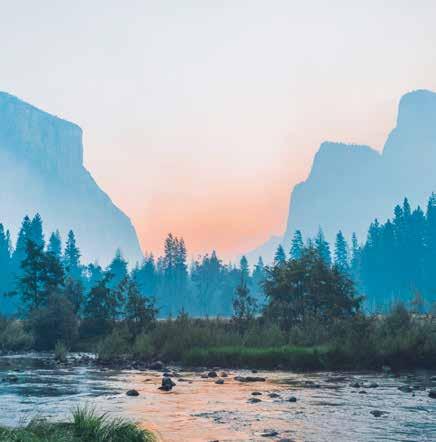
mild to moderate depression. Doctors in Japan have been prescribing sessions of shinrin yoku (forest bathing) – the simple practice of being calm and quiet amid the trees – to their patients since the 1980s and the rest of the world is catching on. In Canada, clinicians have now teamed up with Parks Canada to offer free national park passes to patients to improve their health and wellbeing in an initiative called ‘The BC Effect’ (British Columbia) and a similar programme has also been rolled out in Scotland. Benefits include lower blood pressure, lower cortisol (the stress hormone), easing of insomnia and improved concentration, to name a few.

And in a world that can often feel fragmented, being in nature helps us feel connected to something bigger than ourselves. It can remind us of our place in the world, and our responsibility to protect and care for the planet.
“Our values are shifting,” says Reddy. “People want travel that aligns with eco-conscious values, and are keen on immersive, authentic experiences. Trips that are low impact, organised by local communities and take you into beautiful natural landscapes tick the boxes. On top of concerns around our carbon footprint, we live in a polarised world, with multiple stresses and nature can be a refuge for many. It’s a chance to escape from the digital world, reconnect with ourselves, and have our souls touched by the beauty of wildlife, and indigenous perspectives.”
We’re seeking days made fuller by tiring treks in sometimes freezing conditions, simple rooms sometimes shared with strangers,
and hearty dishes cooked by local families. Trips that strip back life to the essentials and immerse us in the environment because when there are no walls or buildings fencing our vision, the mind can stretch. The simple act of walking can lead us to new outer and inner spaces, until, finally, we step into an alignment with our small place in the order of things.
This direction in our travel needs may feel new, but of course we’re just going back to the way things were. Immersing yourself in nature is an ancient remedy to reduce stress, and restore strength, which are some of the main reasons most of us travel, right? We go away to switch off. Rest. Recharge. Escape the day to day. Bringing back memories and lessons we can integrate into our lives, so we can live with more wisdom, wonder and empathy – gifts that are the greatest luxury of all.
Left
Unspoiled nature as seen in Zelenci Nature Reserve, Slovenia is one of today’s luxuries
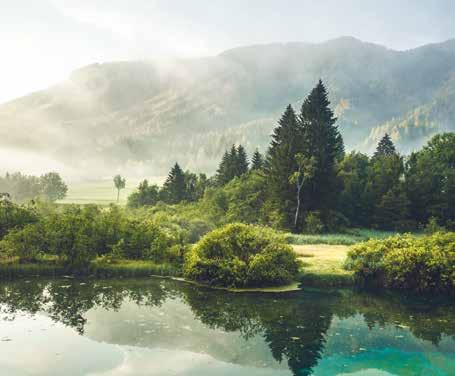
Above Being in the moment while watching a Flamingo in the Laguna Colorada, Bolivia
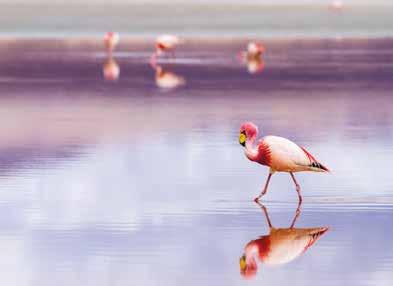
Escapes: 50 Inspiring Destinations to Find Zen published by Quercus (quercusbooks.co.uk).
of
You can follow her travels on Instagram @emmathomsontravels
“We’re returning to the realisation that less means more.”
Emma Thomson
Author
Quiet
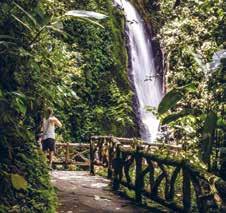
For a tiny country, Costa Rica packs a huge wildlife punch. Containing 5% of the world’s biodiversity, its thick rainforests, magnificent volcanoes, and labyrinthine limestone caves teem with life, from brightly coloured toucans to slow-moving sloths. Cruise through jungle waterways, try white water rafting, or relax on beaches alongside sun-bathing iguana. exploreworldwide.com.au/CC
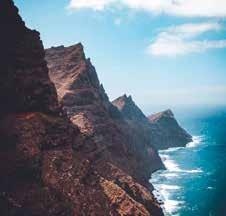
Offering so much more than just beaches, Gran Canaria’s wild beauty is best explored on foot. You’ll find dramatic volcanic landscapes, steep gorges, high peaks and semi-tropical valleys. Re-fuel after days spent hiking and dine alfresco on traditional Canarian cuisine washed down with a glass of sangria. exploreworldwide.com.au/LOC
For out-of-this-world landscapes, exploring Chile’s Atacama Desert and the Salar de Uyuni in Bolivia are absolute musts. See the surreal expanse of blinding-white salt flats, experience dramatic red gorges in the driest place on earth, and don’t miss the coloured lagoons packed with vibrant pink flamingos.
exploreworldwide.com.au/ABC
Cycle through the remote Hamada Desert of the Sahara, discover kasbahs and cool oases in the Draa Valley, and enjoy an exhilarating High Atlas descent through the Berber heartland.

exploreworldwide.com.au/CSO
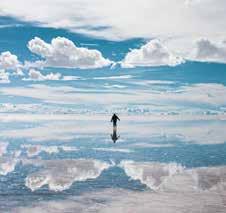

Marvel at towering tabular icebergs and keep an ear out for the creak and deep rumble of glaciers. The vast, ice-sculpted Antarctic wilderness is a place like no other on earth.
exploreworldwide.com.au/GMWA
Sometimes you can’t beat the buzz of a city, but other times we crave the space and tranquillity of nature. Here are five of our most breathtaking adventures in the ‘wild’.
Exciting news! Over in Our World, we’ve been super busy planning new adventures. Here are just some of the incredible trips coming your way, chosen by our team. You heard it here first!
6 HOT NEW TRIPS
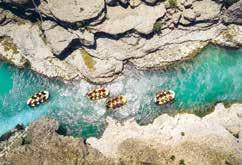
SICILY
8-DAY FOOD TOUR
‘This has gone straight to the top of my wishlist. Sicilian cuisine, fine wines, buzzing old towns, all in breathtaking scenery. What’s not to love? I’m so excited that our gastro tours have expanded into this part of the world.’
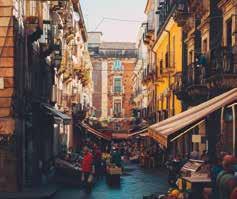 James Adkin, Programme Manager Asia & Middle East
James Adkin, Programme Manager Asia & Middle East


TUNISIA
8-DAY DISCOVERY TOUR
‘Tunisia is a country I’ve always wanted to visit.
It’s known for its warm hospitality, and a rich cultural background combining influences from the Middle East, Africa and Europe. You’ll find yourself haggling in a bustling souk, walking among the Roman ruins of Carthage, and even camping out in the desert.’
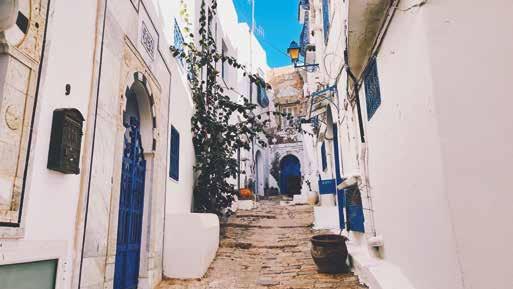 Mark Steventon, Business Analyst
Mark Steventon, Business Analyst

ALBANIA
8-DAY FAMILY TOUR
‘High-ropes and white water rafting with the family sounds perfect! That’s next summer’s holiday sorted.’
Kerry Edwards, Customer Service Consultant
‘Having worked on Polar ships in the past – I like travelling to cold places. So taking an ice-breaker cruise in the Sea of Okhotsk and then seeing the snow sculptures at the Sapporo Snow Festival is right up my street – I can’t wait!’
Rachael Stone, Head of Product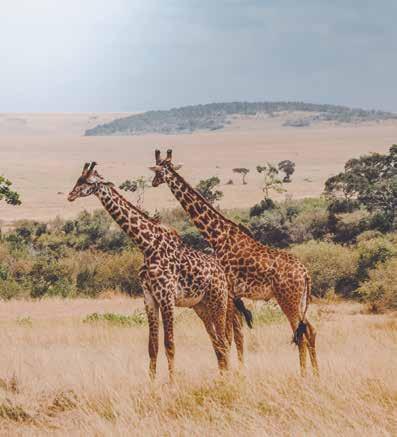
‘It’s fantastic to see Kenya featuring again at Explore. To me Kenya is the true classic African safari –the vast open plains of the savannah are just how you picture a safari. I can’t wait to go in August time to witness the Great Migration – when 2 million wildebeest cross the river from the Northern Serengeti into the Maasai Mara – a real bucketlist dream of mine!’
Sarah Phelps, Customer Service Consultant
‘As an animal lover and amateur wildlife photographer, the Galapagos is my dream destination! I’m so excited about this new tour as I’m dying to see Darwin’s wildlife paradise for myself.’
Helen Pettitt, Digital Content Manager

Supporting initiatives in the countries we visit has always been part of Explore’s DNA. Setting up a structure to enable us to more effectively impact the lives of communities worldwide has been a dream of ours for some time. This summer we were thrilled to launch the Explore Foundation with two projects close to our hearts. One Bike in Tanzania is one of those projects.
ocated at the foot of Mount Kilimanjaro in Tanzania, One Bike uses bicycles to benefit the local community through education and environmental awareness. We spoke to Hillary Matemu, founder of One Bike, to find out more.

Tell us a little bit about One Bike and why you set it up?
One Bike is a social enterprise set up in 2018 that uses bicycles to reach and empower communities. We believe that a bicycle is a sustainable way of travelling, but also something that can impact a community, socially and economically. And most importantly, we believe a bicycle can be used to protect our environment!
There are so many reasons why One Bike was set up, but the big picture for me was to help my community and promote a sustainable way of travelling in Tanzania. A bicycle seems such a simple thing to so many, and perhaps something taken for granted in much of the world, but having access to a bicycle can have such an impact and bring real change for people in our community. I wanted to empower my fellow youth and promote cycling in our country – and things have been improving over the six years since we started. What single thing are you most proud of so far?
I’m proud to have made an impact in so many ways. We’ve empowered young people through mechanical training. We’ve improved environmental protection and awareness through our recycling tour. We’ve improved mobility for rural women through donations of bicycles. And we’ve improved the cycling industry in Tanzania. In a nutshell, I am proud of driving change in my community in a positive way using our bicycle approach.
What is the ultimate goal of your Women on Bikes initiative?
To improve mobility for rural women. An important factor for human development is freedom and ability to move from one place to another. For many years, movement in rural areas for women has been restricted due to little or no access to public transport. Donating bicycles to these women as an empowering mobile tool enables them to improve their lives. Thanks to our bicycles, they can more easily reach the market, farms, shops, health centre and other areas in a flexible and sustainable way.
What does the support from the Explore Foundation mean to One Bike?
It means a lot. Thanks to this support, more and more women are going to benefit from the donations of bicycles which will mean a huge impact on their lives and their community. The support means that the mobility project will now be able to achieve the goal that was set!
How many women do you anticipate will benefit from Women on Bikes this year?
This year we’re expecting that more than 50 women will benefit from the project. The more support we get, the more we can donate bicycles to rural women.
What are your aspirations for the future of One Bike?
To see improved communities. To continue to promote cycling as an environmentally friendly mode of transport and the way forward for sustainable cities. To continue to empower young people and make an impact in our communities. Our purpose is to help improve the lives of people and protect our beautiful planet through the humble bicycle.
To find out more about the work that is supported by the Explore Foundation, visit theexplore.foundation
Meet two women whose lives have been positively impacted by the One Bike initiative.

Mariam Nassoro, age 37
‘I use my bicycle to go to the market, the farm and fetch water because sometimes we don’t have water at home. Having a bicycle has made my life easier since I can now move from one place to another in a short time. My friends and family have benefited from me having a bike. As a mother I am responsible for managing many things – my bicycle means I can cook on time for my family, and it helps me provide other important services that my family rely on me for directly.’
Mwanaisha Rajabu, age

29
‘My bicycle has enabled me to visit different places like church, the farm and the market. My bicycle has become very important to me. My movement from one place to another has now been made so much easier. Now I don’t have to think about other forms of transport or finding the bus fare. Now I can take my daughter to school, so she has benefitted from my bicycle too. And because I sell vegetables, I’m now able to reach many more customers in a much shorter time.’
“I am proud of driving change in my community in a positive way using our bicycle approach.”Opposite One Bike empowers women and their local communities Above Hillary Matemu in front of the One Bike Workshop
When journalist Xenia Taliotis experienced a personal loss, it was travel that helped her find joy again. Here she speaks to fellow adventurers who travel solo by choice.
Words –– Xenia Taliotis
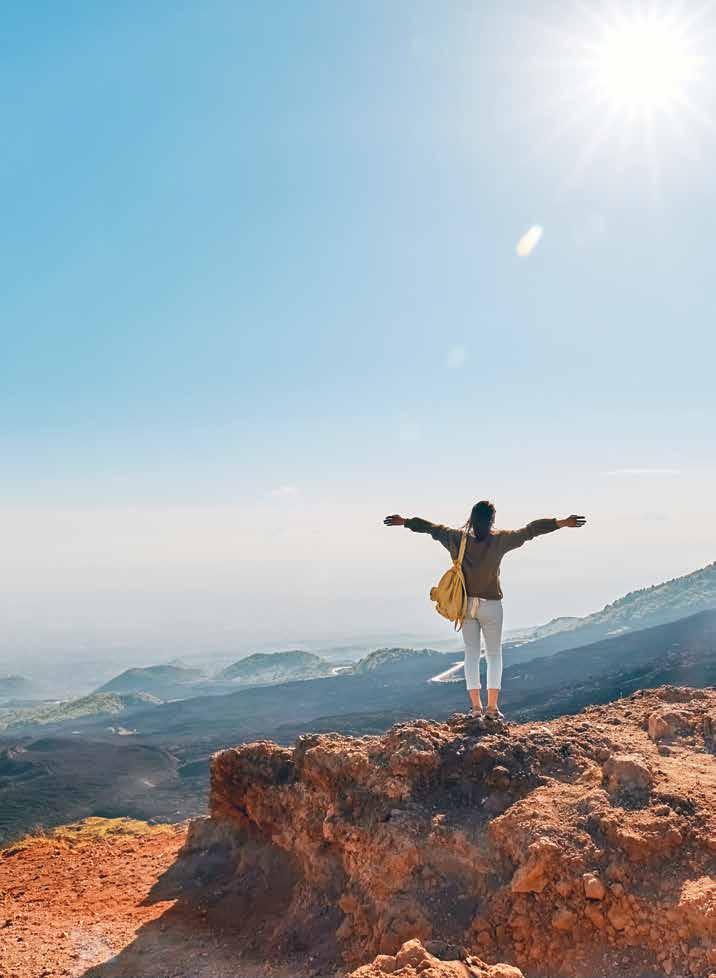
Opposite Travelling ‘solo’ can expose you to completely new experiences
Right On the way to the top of Mount Etna in Sicily
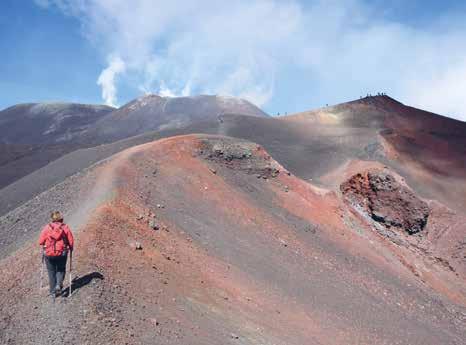
I am a travel writer yet for years I did not travel. After the death of my partner, 18 years ago, I shrunk from the world. Light was too bright; sound was too loud; colour was too vivid; life was too much.

When I did eventually feel able to go away, I went on holiday with friends – an ill-advised decision, as it turned out, since their hope was that the trip would bring the old me back. My attempts to be jolly and engaged took so much out of me that I returned home depleted.
It took another two years before I felt able to try another break. By then, my friends’ circumstances had changed so I no longer had travelling companions: if I wanted a holiday, I’d have to go alone.
I considered my choices. They boiled down to taking off on my own; having a going-to-see-relatives pretend holiday; doing a special interest break that promised to turn me into a painter, a poet, a potter, or going on an escorted group trip…
I opted for the latter – a week’s hiking in Sicily. I took time deciding what to do and where to go. It was such a big step, that first one towards re-orbiting life. In the days before the departure date, and while waiting for arrangements of where to meet the group at the airport, I was gripped with old anxieties and new: would I make friends? Would everyone else on the trip be coupled up? Would the experience only make me more acutely aware of how lonely I was? Would I be able to get away from the others if I needed time out?
To ensure that I would, I paid to have my own room. That was money very well spent since there were nights when I went to my room and cried, but they would pass and
a new day would arrive, and that would take me up into the mountains and show me what wonder I had been denying myself.
Scrambling to the top of Monte Venere; standing on the lava-covered slopes of Mount Etna and realising that the best way to descend was not by placing one careful step after another, but by leaping and allowing the scree to sweep me down jolted me back to life. For the first time in years, I felt glad to be alive. My body was strong – it could take a physical leap, but crucially, the metaphor in the action had a longer-lasting impact – without jumping I would remain forever confined and defined by grief. That trip to Sicily set in motion a monumental change in me. I wanted to travel. I wanted to engage with people. I wanted to experience new things and to have adventures. Above all, I wanted to live. And I was absolutely fine to do all these alone.
Since that first solo trip to Sicily, I have more than made up for the years I spent inert and lost. Often, I have opted for group travel, choosing the security, convenience, insider knowledge provided by expert guides, and ready-made company above doing the planning myself. I’ve met like-minded and un-like-minded people. Some have been friends only for those few days, and one or two for much longer. It doesn’t matter – I don’t go hoping for forever. I go hoping to enjoy the present.
Time and age have brought self-awareness and a shedding of inhibitions and preconceptions. Necessity turned me into a solo traveller, but I have grown through that and consider myself to be a truly independent one.
“For me, that group trip to Sicily was a springboard out of mourning.”
“Since that first solo trip to Sicily, I have more than made up for the years I spent inert and lost.”
I have changed in the nearly two decades since my partner died, and so have perceptions about solo travel. There is no stigma associated with being single and, anyway, solo holidays aren’t just for the unattached. In fact, travelling alone is one of the greatest luxuries of all – a young colleague of mine calls her annual solo breaks her best gift to herself. For one week a year, she leaves her friends, family, and partner behind to go somewhere new, to indulge her passions, and in this, she is part of a growing trend. Travel search engine, Kayak, has reported a 36% increase in searches for single-person flights in 2023 compared to 2022, while a survey by Skyscanner paints a similar picture: 29% of respondents said they were considering a solo escapade, with time for themselves being a key factor. Interestingly, 51% of UK travellers who wanted to go it alone said the motive was to give their mental health a boost – they felt a need to focus on themselves.
For me, that group trip to Sicily was a springboard out of mourning. It didn’t mend my broken heart, but it did free it from being tethered to sorrow. As the 14th century explorer, Ibn Battuta, wrote, ‘Travelling, it leaves you speechless, and then turns you into a storyteller.” But more than that, travelling has changed the story I have to tell.
Of course, it turns out I am not alone. Speaking to other solo travellers who travel on their own for different reasons, I discover that their stories have changed too. Here are just two of many fascinating people I have met along my path.
Below left Stephen cycling the Col du Glendon, France
Below right Travelling with a group of like-minded people makes solo travel easier
Stephen Wheatley, 68 from London. Volunteer Crew, RNLIMy wife and I met as fully formed adults, with fully formed interests and even after being happily married for nearly 40 years, we have yet to morph into one. She has her passions, and I have mine. She enjoys going on painting and cooking holidays, while I seek adventures, mainly on cycling breaks. Giving ourselves this time to enjoy our own pursuits has helped strengthen our relationship.
I’ll either go away with my cycling club, or on a group holiday. I’m 68 now, but I think even 30 years ago, I’d have chosen escorted travel over a solo trip. Anything can happen – a bad fall, an accident – just knowing you have people who could save your life on hand is immensely important – for me, and for my wife, of course. It gives her peace of mind.
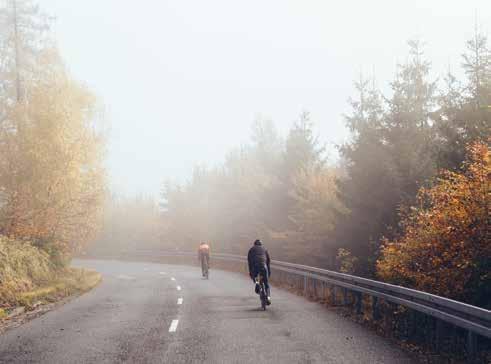
The other thing I like about going with a group is having a local guide as our leader. When I travel with friends, the places we sleep, eat, drink are perfectly fine, but we sometimes feel that there’s something better just within reach – except we don’t know where it is. That’s never the case on an escorted break. The guides always know the best places, places you’d never have found on your own, and this is true even in France, which I’ve cycled through loads of times, and which I know well.
I’ve had many great trips, but one of the best was cycling the Col du Glendon, in the French Alps. It’s tough – really, really tough – and I didn’t think there would be anyone there to see me finally cross the finishing line. But what had happened was that the two guys leading the tour, who had shot past me a while before, were waiting at the top with a bottle of champagne. The camaraderie and support I found in that one gesture made me cry. That and the sheer relief of having actually reached the end.

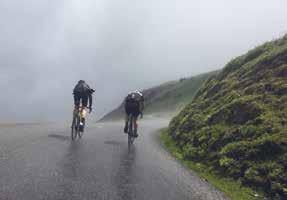
“Follow your own passions, not your partner’s.”
“Even when I go with a group, I can find the peace I seek.”

If you’re unsure about heading into the desert alone, we’ve got you covered with a brand-new adventure! Combine a visit to both Jordan and Egypt and make it a perfect sandy solo adventure. exploreworldwide.com.au/PP
Wander the Amalfi Coast
Italy’s iconic Amalfi Coast is on many solo travellers’ bucket lists. Make new friends as you hike along the spectacular clifftops and ancient stone stairways that link the villages of the region.
exploreworldwide.com.au/NAW
Explore Jamaica
Madeleine Roscoe, 58, Glasgow. University

Above
Above
My husband left me for his other woman in 2016. I thought it would crush me, but after the shock had worn off, I gave myself a good talking to. I could either stay home lamenting and crying snotty tears into my wine, and onto my friends’ shoulders, or I could do something that would boost my confidence and give me something else to talk about. I chose the latter. I booked a solo trip to Peru. Just before the trip, my anxiety threatened to overwhelm my excitement. It was like any day before… the first day at school, university, work. All those fears we all have – about being the odd one out – were running riot through my brain, but the minute I met the group, those horrible voices in my head fell into silence.
Want to go solo but have some questions? We’ve answered the most frequent ones on our blog: exploreworldwide.com.au/top-solo-questions

Xenia Taliotis
25 exploreworldwide.com.au Going Solo“I love going away by myself. I have a hectic job, and family pressures, so a holiday to me is leaving everything behind...”
“Divorce was the beginning of rediscovering what made me happy.”
Professor
A walking holiday promises fresh air, new friends, and a sense of purpose. Caroline Phillips, Explore’s Walking Programme Manager offers advice on how to prepare for your first adventure.
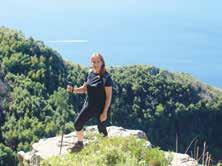
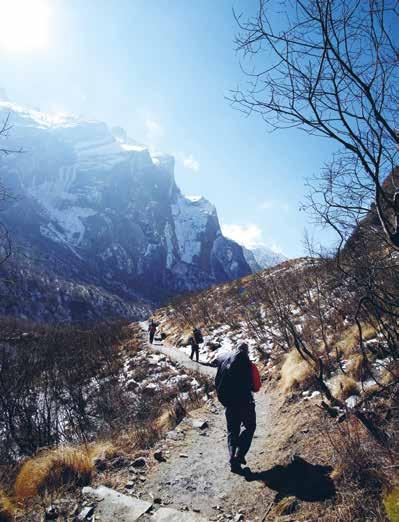
For more than 20 years now I’ve been involved with walking and treks having started out as an Explore Tour Leader. I’ve led groups to many places throughout Europe, Asia, and Africa, from Poland to Mount Kilimanjaro in Tanzania. My first job was for six months in Southern Turkey, walking along the Lycian Way – I loved getting to know this slice of rural Turkey and its people during my time there.
Over the years I’ve been lucky enough to walk in some amazing places – the Himalayas, New Zealand and Vietnam – but one of the trips that took me by surprise was to Madeira. This island has a reputation as a destination for rather staid people, and perhaps my expectations weren’t so high, but it offers the most incredible island walking, through forests, along clifftops, and alongside waterfalls, with a fascinating ecosystem. That’s what I love about walking tours – each one is different. Walking also gives your trip a sense of purpose, something to achieve, be proud of, brag about afterwards if you want! But taking the plunge and booking your first trip can be intimidating, so it’s useful to know what to expect and how to prepare.
The first question people often ask is ‘what if I’m not fit enough?’ All walks are different. The required fitness levels vary depending on the holiday you choose. Explore tours all have a grade, from Leisurely to Challenging and
Walk the Eastern Algarve – Portugal
With leisurely walks, fabulous scenery, picturesque villages and tasty Portuguese food, the Algarve is a great place for your first walking adventure.
exploreworldwide.com.au/WIA
Walk the Spice Trails – Jordan
Retrace the steps of the ancient Nabateans and walk along old spice trails to the rock-carved city of Petra before continuing into the canyons of Wadi Rum.
exploreworldwide.com.au/TP
Walk in Crete – Greece
Discover isolated beaches, secluded coves, and stunning canyons as you traverse the White Mountains and explore the Samaria and Zaros Gorges. Stop for fresh seafood in welcoming villages along the route. exploreworldwide.com.au/CR
Tough, which also indicate how much prep you may want to do before you go. No formal training is needed for most. As important is to get a good pair of walking boots that fit well and that you’ve broken in properly, and well-padded socks.
The more challenging the walk, the more support staff there’ll be. On harder grade treks you’re often split into sub-groups so you can decide to hang back or stride on. And remember, it’s about immersing yourself in the surroundings, observing, taking photos, admiring views, nature, architecture – it’s not a race.
Next question is usually ‘what to pack?’ Again, this will vary depending on where you go, but you’ll get detailed advice before you travel. My general tip is to pack layers as weather can always be unpredictable. Decent boots, of course. At least one water bottle, a hat, sun protection, trekking poles for harder treks and a small first aid kit in your daypack. On all Explore walks, your luggage will be transported for you between overnight stays.
I’m often asked about walking as a group and if it’s suitable for solo travellers. A walking tour is a brilliant way to meet like-minded people, and a great way to make friends. The chat flows more easily as you walk, or you can
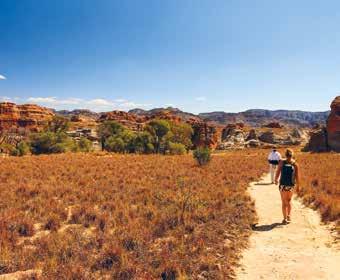

Opposite
Opposite right Start slow and easy and work your way up to a more advanced level tour like the Annapurna in Nepal
Below Walking with others will help you improve your walking skills
Right Walking is perfect if you want nothing between you and the place you visit
Walking poles – my knees are forever grateful to them!
My Explore Water-to-Go refillable water bottle.
Walking shoes that have been properly worn in.
choose to hang back if want quiet time on your own. You’ll meet plenty of solo travellers on a walking holiday who rebook with friends they’ve made.
And what if you want to opt out of walking? Easier graded trips are more likely to have rest days and shorter walks. If you want to explore destinations in more depth, a Leisurely grade tour would be for you, especially a centre-based trip where you stay at the same place throughout and take different walks each day. This means you have the option to stay and do your own thing for the day if you choose to.
Doing something completely new is always a little daunting, but from my experience no one ever regrets a small group walking holiday. You won’t lose your way, your guide will have your back if you want to take it easier, and you’ll really get a sense of having achieved something amazing.
Looking for some ideas on where to walk next Autumn? Find out here: exploreworldwide.com.au/ best-autumn-walking
“It’s about immersing yourself in the surroundings, not a route march or achieving a PB.”left Caroline Phillips walking along the iconic Amalfi Coast
So, it’s got unspoilt beaches and pristine reefs. It’s got vast jungles, diverse wildlife, and a rich history. It’s even got great food. But Belize is all about the vibe. A chilled ‘go slow’ spirit that hits you the minute you land and are greeted by the joyous ‘Welcome to Belize’ sign.
Tucked in between Mexico and Guatemala, Belize is the hidden gem of Central America, but it feels more Caribbean. To the east are warm Caribbean waters and the Belize Barrier Reef. Guatemala is to the west, and Mexico is north, but Belize seems a world away, with a mishmash of cultures that takes you by surprise. Garifuna, Mexican, Caribbean all rolled into one. And the main speaking language is English – so no need to brush up on your Spanish skills before you arrive. Despite its small size (it’s only a third of the size of Tasmania!), you have ancient ruins, abundant wildlife and over 400 stunning Cayes (islands).
Belize is leading the way in terms of conservation efforts, and Caye Caulker is home to the second largest barrier reef in the world. It’s divided into different areas (for local fishing, tourist boats etc) but the vast majority is reserved as a protected area. The rangers that take you snorkelling are so respectful and are clearly looking after the environment –rules are kept, controls are tight, and the permit you buy for the privilege of being there feels like money well spent. There are different diving and snorkelling excursions to choose from, and all are spectacular.
The country rivals Costa Rica for wildlife and any bird lovers will want to bring a good camera and pair of binoculars. You’ll spot
iguanas sunbathing by the pool, crocs on the riverbank and, if you’re lucky, protected jaguars in the trees at the Cockscomb Jaguar Sanctuary
Also worth a visit is the Community Baboon Sanctuary where several tiny villages decided to band together and create a protected area for Black Howler Monkeys. It’s a completely wild environment that gives 30km2 of free-roaming space to the monkeys (also home to anteaters and armadillos). Take a nature walk through the forest and you’re almost guaranteed to see one of the troops there. There are about 1,500 howler monkeys living across the whole area.
There are a wealth of historical and natural landmarks in Belize, but the ATM caves in San Ignacio are a must. Not for the faint hearted –this is a real adventure. You’ll wade through rivers at neck height, clamber through narrow spaces and hike through the jungle, submersing yourself into the ancient world of the Maya.
Another must-visit is Lamanai (meaning ‘submerged crocodile’), one of the oldest archaeological zones in the Mayan world. Only accessible via a boat trip upriver through the jungle, it’s very atmospheric and covers a huge 860 acres. The size and quantity of the temples are astonishing – there are lots of steps so choose the temples you want to explore with that in mind.
Here’s a fact – Belize is the only country in Central America that doesn’t have McDonald’s! The culinary offer here is a delight. Glorious local seafood (try the calamari-like conch, that you find in conch shells), Belize-style BBQs, fresh fruit (papaya, coconuts, mango, watermelon), and rum (it’s strong, be warned).
The food is totally diverse because of the mixture of Caribbean/Garifuna culture and Belize’s proximity to Mexico. So, you’ll find interesting Latin dishes like tamales and ceviche, but then more Caribbean dishes like salt fish, fry jacks (puffed up deep-fried flour dough, normally eaten at breakfast) and rice and beans
“Tour leader Wilfred swears the CocoBerry Cocktail was his invention (coconut, rum, and cranberry). It goes down very nicely, whoever came up with it!”
Carmel Hendry, Programme Manager for Belize
Belize: the best-kept secret in Central America?
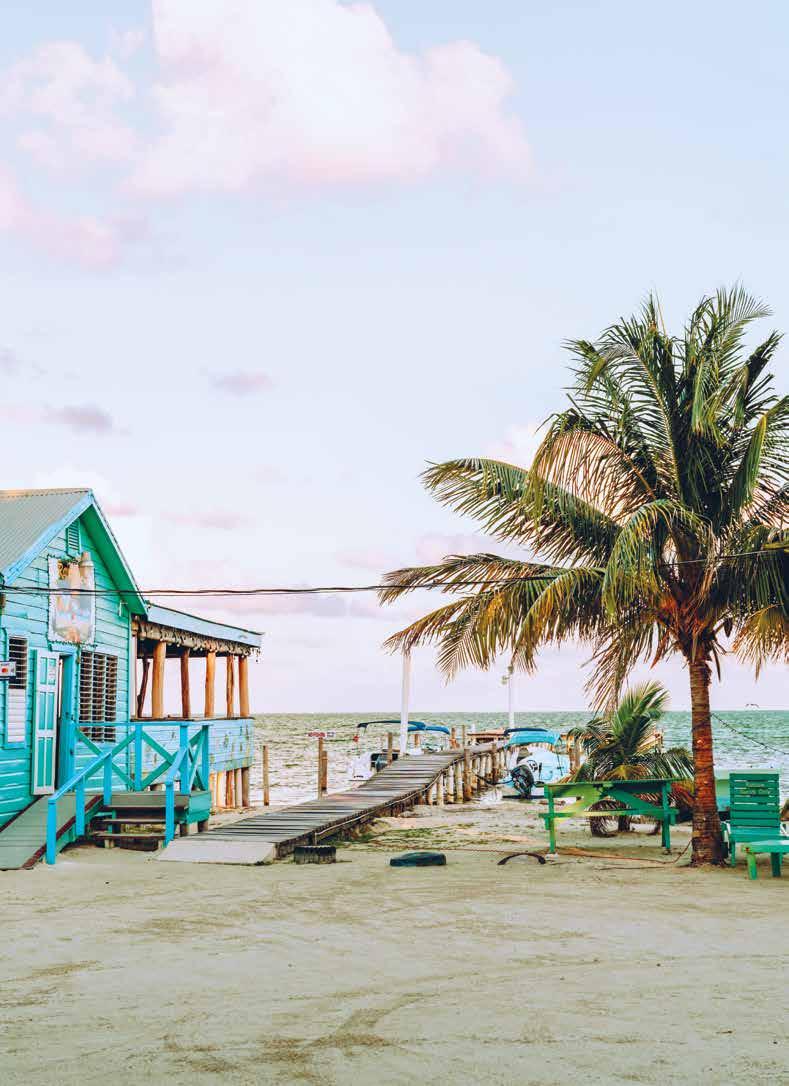
Page 29
The book to read:
Beka Lamb by Zee Edgell
The film to watch: The Mosquito Coast
The documentary to watch: Unknown Belize
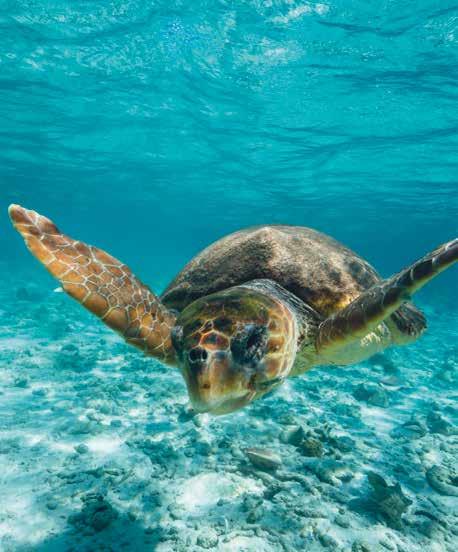
The music to listen to: The Sound of Punta Rock –Spotify playlist
Belizeans seem to make wine out of almost anything, and many of the resulting liquids taste more like a sherry or port. Cashew nut wine is an acquired taste, while blackberry wine is more easily digested. Tour Leader Wilfred swears the CocoBerry Cocktail was his invention (coconut, rum, and cranberry). It goes down very nicely, whoever came up with it!
Chocolate is also plentiful for the sweettoothed (they grow cocoa beans here) but be sure to eat it quickly as it melts in the heat. If you want to bring some back home, opt for cocoa nibs and powder. And do try some of the more alternative ice cream flavours. Corn-on-the-cob ice cream, anyone?
Belize has a massive Mennonite community –similar to the Amish in the USA – who are the biggest farmers and food producers in the country. So, you’ll drive through areas of Mennonites where they still use horse and carts, and wear Germanic style overalls.
Below The masks at the Mayan city Lamanai are adorned with the headdress of a crocodile, falling in line with Lamanai’s namesake which means “Submerged Crocodile”
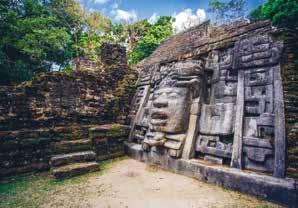
“Do try some of the more alternative ice cream flavours. Corn-on-thecob ice cream, anyone?”
Watch your knees. Choose your temple steps wisely.
Take binoculars, even if you’re not into birdwatching. Trying to spot those toucans in the trees gets infectious –you’ll soon be hooked!
Look out for the best placenames: Scotland Half Moon, Black Man Eddy, Tea Kettle, and the best one, Doublehand Cabbage!
Fancy trying a CocoBerry cocktail in Belize? Look at our Belize tour here exploreworldwide.com.au/BL
Left Belize is home to the Mesoamerican Barrier Reef, the second largest reef in the world30 The Explorer Spring 2023
Meet Wilfred, Explore’s local Tour Leader for 8 years, and a legend in the eyes of staff and customers. His experience growing up in Belize brings meaning to his guiding, his stories will have you in stitches. We asked him to share some of his local knowledge.

In Belize we operate on our own time. Put it this way, if you’re an hour late, you’re still on time – as long as it’s the same day! When someone says ‘right now’ that can mean anything from a few minutes to a few hours. It’s very chilled. Everyone moves slow here, and it encourages you to also be relaxed. We sit down and enjoy each other’s company. We love to stand on the side of the street for small talk. Be prepared for how very courteous people are. Locals are always looking for opportunities to be helpful and do something good. People will say ‘hello’ even if they don’t know you. There’s no ulterior motive – we’re just an incredibly friendly bunch!
Don’t go home without snorkelling.
Make sure you head out to the barrier reef and try to spot a queen angelfish or, even luckier, a spotted eagle ray. And you mustn’t leave Belize without taking a canoe out on the river. It’s so peaceful meandering through the rainforest and you may have the opportunity to see Neotropic river otters and kingfishers – on one trip it’s possible to spot all five species.
Our national dish is rice and beans.
It may sound bland but let me tell you, if you try the homemade version cooked up by one of the
older ladies in one of the Creole villages (and I can introduce you to one of them) it’s absolutely delicious! And make sure you tuck into the seafood grilled every day on Caye Caulker. Most people head there in the evening, but they start cooking from around 11am so visit at lunchtime for an ultra-fresh feast.
There’s always time to dance.
For a good boogie I love the beachside open-air Tipsy Tuna in Placencia. It’s all wooden floors and bright coloured furniture and has a really relaxed Caribbean-reggae vibe. My favourite place to eat? The name isn’t great, but The Food Republic on Caye Caulker dishes up food-to-die-for – especially the catch of the day.
Do you want to know a secret?
Our Mayan temples have amazing acoustics. You can stand at the top and whisper, and people down in the plaza below can hear you!
Guiding brings me so much joy.
Tourism can be a real force for good, it helps preserve the loss of rainforest otherwise cleared for farming. But also, even though tourism is our largest industry, Belize still has so many beautiful unvisited places –waterfalls, caves, cenotes – that no-one is going to. A lot is still untouched.
We honour our top leaders each year in the Explore Leader Awards. The awards recognise hard work, passion and a dedication to your holiday’s success. Have you had an outstanding Tour Leader on an Explore tour? Nominate them here exploreworldwide.com.au/ leader-awards
Our knowledgeable expert leaders are the icing on the cake of our trips. Holidays without them would be much less rich and nowhere near as delicious.
“If you’re an hour late, you’re still on time.”
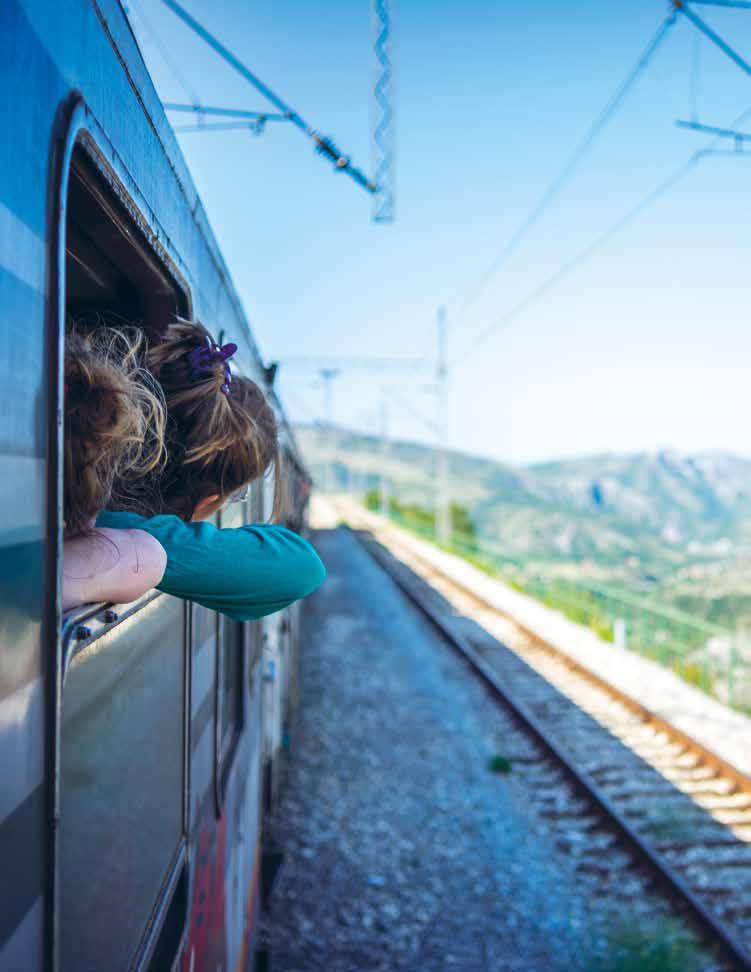
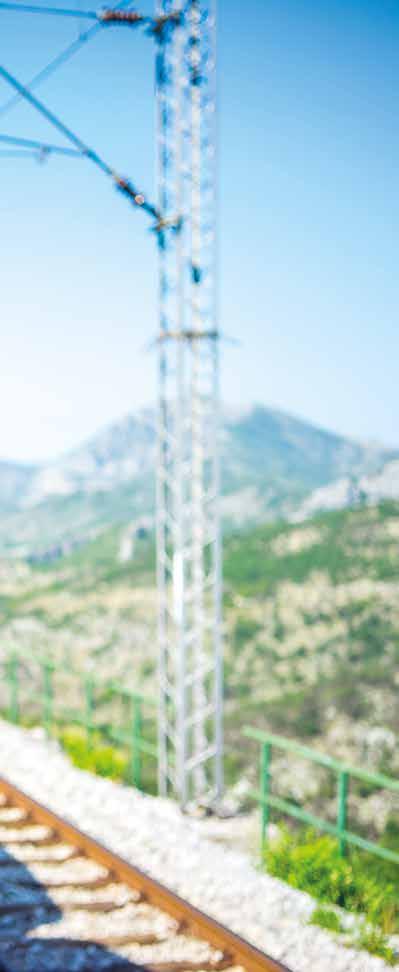
In the autumn of 1928, Agatha Christie stood on a platform at Paris’ Gare de l’Est and looked up at a train that would take her on arguably the greatest adventure of her life. From the blurred city glow of the station forecourt, past newspaper vendors to what was almost a stage cloaked in ceremony, she eyed the series of gleaming wagon-lit carriages adorned with brass lion crests and knew that few other journeys could rival it.
Whistles were blown, doors pressed closed and, as the carriages began to rock down the rails, the author’s head filled with the destinations ahead: Yugoslavia and the Balkans, the Sea of Marmara in Turkey, the Cilician Gates of the Taurus Mountains, then finally, Damascus, Baghdad, and the ancient sites of Iraq. Years later, Christie’s experience on the Simplon-Orient Express would inspire her bestselling novel, Murder on the Orient Express, and a quest for further rail adventures across the Middle East and Europe.
In the century since, travellers have been able to take in many of the same views, which have barely changed. But what has changed, is train travel itself. Nowadays, it is both a method of transport and a record of travellers’ concerted efforts to journey lighter, slower, and more sustainably. Its evolution towards something more authentic, is also a rebuff to the freneticism of airports, plane departures and the pace of accepted 21st-century travel. Few places feel quite so actively relaxing – so purely placid – as being in a train carriage with a window on the world. As Christie once wrote, “to travel by train is to see nature and human beings, towns and churches and rivers – in fact, to see life.”
For me, I’m fortunate my career has taken me to many of the world’s most faraway stations. I’ve ridden in Christie’s footsteps on the Orient Express from Paris to Venice and journeyed on lines from Moscow to Beijing, Lhasa to Chengdu, Mombasa to Nairobi, Colombo to Jaffna, Tokyo to Sapporo and others – many of which evoke the drama of a Hercule Poirot mystery with their exotic stations and indecipherable timetables.
I remember taking the night train from Cairo to Aswan, the first of many overseas rail adventures; as the sun rose in the morning, its rays gilded the Nubian Islands of the Nile Valley and my eyes were struck by white-sailed feluccas caught in the crosscurrents, as if they were part of an ancient regatta. It was all very Agatha Christie like,
More immersive, more relaxing, and more sustainable, train travel just might be the most authentic way to explore the world, says travel journalist Mike MacEacheran.
Page 32
When
Below Travelling
despite the passing of time. Other nostalgic snapshots stand out: looking across the Moroccan desert while onboard a train to Casablanca with my 75-year-old mother; she’d always wanted to ride the Marrakech Express. And at times when rain clouds gather when I’m back in the UK, I find myself thinking about the almost-pink deserts of Rajasthan and the evening when our sleeper stopped to make way for a nomadic camel train. I’d never have seen that if I’d flown.
Wind the clock back, and I first fell for the easy rhythm of train travel closer to home in Europe in the late-1990s, the regal yet ramshackle otherness of platforms in Budapest, Ljubljana, Bratislava and Prague, a long way from Glasgow for a tenderfoot 18-year-old on a month-long Interrail trip. When I remember the faded splendour of these stations today, they still murmur to me of the romance of train travel.
The pay-off for first timers nowadays – and veterans who love the spontaneity rail holidays provide – is a tourism experience that is, justifiably, on the up. According to Tom Hall, head of Lonely Planet UK and author of Train Travel in Europe, there are several factors that explain the rise of train travel. It was already a growing trend before the pandemic, he explains, but demand has continued to surge over the past two years, for both specialist tour companies offering holidays by rail and more traditional operators adding train options as a sustainable option.

Explore’s research also reflects the desire to swiftly move from plane to train. Recent fact-finding shows more than half of guests want to travel more sustainably, with nearly the same number embracing the idea of slow travel to do so – crucially, more than a third love the romance of rail travel and see it as the ultimate climate-mitigating solution.
“This is a truly immersive way to travel – not a race to get to your destination so the holiday can start, but rather an appreciation of the journey,” says Explore’s Michael Edwards. “Getting closer to the destinations you’re travelling through, watching countries as they blend into one another, and travelling with all sorts of people – locals, commuters, and international travellers – mean these are journeys packed with life and colour. But it’s also a more sustainable way to travel, and one that has extra draw now as we become increasingly aware of the importance of making lower-carbon choices.
Explore’s commitment to increasing overland travel options satisfies both sustainability objectives and travellers’ wanderlust. London to Bordeaux, the Basque Country and the Beach, with an option to extend to
“This is a truly immersive way to travel –not a race to get to your destination so the holiday can start, but rather an appreciation of the journey”travelling by train, the journey is part of your holiday (and sometimes the highlight)
Balkans Rail Adventure
Explore Europe’s newest countries. Travelling by rail, this fast-paced tour gets under the skin of Yugoslavia to experience thriving cities that remain undiscovered by most travellers. exploreworldwide.com.au/YUG
Venice to Rome

Travel across Italy by train on a romantic adventure taking in the sights and delights of some of its most iconic cities. Sip a spritz in Venice, wander the food markets of Bologna, gaze out over the beauty of Florence from Piazzale Michelangelo and people watch in the piazzas of Rome. exploreworldwide.com.au/VTR
London to Marrakech
Watch as Europe slowly transforms into Africa. From baroque Bordeaux to the Moorish heritage that comes to life in Andalucia and the characteristic minarets and medinas of Morocco, travelling by rail is the stylish way to arrive in Marrakech. exploreworldwide.com.au/RLMO
Morocco, provides respite from the intensity of a typical fly-and-flop holiday on the Iberian Peninsula. A more mysterious journey for most is to be found on the Balkans Rail Adventure, which peels back the layers of what was once Tito’s Yugoslavia to explore the likes of Croatia and Kosovo, North Macedonia and Bosnia and Herzegovina –all places where rail tourism is in its infancy. Across the Adriatic, Rome, Sorrento, and the Amalfi Coast is a rail itinerary full of theatrical history, scenery, and, of course, pasta and wine.
For the sort of person to whom sustainability matters as well as scenery, the future of travel is sharply in focus. Explore and other tour operators expect holidaymakers to embrace such new journeys by rail.

It’s almost a relief to know that rail holidays are garnering more support than ever and to me it feels like the good times of train travel are coming again. “Trust the train,” says Hercule Poirot in Murder on the Blue Train, another of Agatha Christie’s blood on the tracks mysteries. In this age of sustainably-minded journeys, maybe that’s something we should all now do – and for a long time to come.
Mike MacEacheran Award-winning travel journalist and guidebook author,writing for publications including The Times , The Telegraph , The Guardian, FT, Conde Nast Traveller, BBC Travel, Lonely Planet and National Geographic

“More than a third of customers love the romance of rail travel and see it as the ultimate climatemitigating solution”
Often, when you’re travelling, the experiences that stay with you are the ones you didn’t see coming. It could be an incredible wildlife sighting or a once-in-a-lifetime sunset. Or it could be a supernatural story that sends shivers down your spine and keeps you up all night. Yep, it might not be for the faint hearted, but if you’re like me, and macabre-inclined, spooky stories and legend can be a great insight into a local culture, past and present. Here are my recent goosebump-inducing favourites.
La Casa Matusita, an unassuming building near Lima’s Museum of Art, carries a haunting past. During the Spanish colonial era, a Persian woman first bought the house. Facing accusations of witchcraft, she was dragged from her home by the Spanish Inquisition and accused of making a pact with the devil. Suffering a fate known all too well by witches of the era, she placed a curse upon anyone entering her house, ensuring a cruel destiny would befall them.
Over the years, the house has witnessed numerous violent incidents. In the 1970s, a renowned TV personality attempted to disprove the house’s haunting by staying for seven days and nights. Within four hours, he was forcibly removed due to psychiatric concerns and never spoke of the house again.
Visit La Casa Matusita on your way to the delicious restaurants nearby and raise your Pisco Sour to honour those who fell victim to the curse. Perhaps, if you offer a drink in tribute to the original homeowner, she may allow you to pass by peacefully.
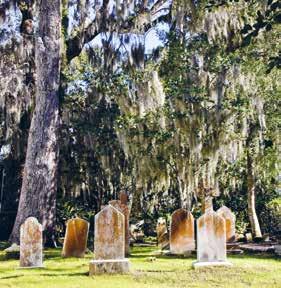
If you’re partial to ghost tours, spooky houses, or tales of the unexpected, we’ve got it covered. Explore’s Amy Fiske shares her fascination with kooky destinations.Far right
Before my Simply Japan trip started, I stayed in Asakusa and ventured 20 minutes north to the old Kozukappara Execution Grounds. Every time this area is developed, they find human remains left by the >200,000 executions that took place in the Edo period until 1873. Skeletons literally pave the road to what is now two temples split by a JR Line. By the Enmei-ji temple you’ll find the Kubi-kiri Jizo (Beheading Buddha) that was erected to serve as the last thing the condemned would see before losing their head.
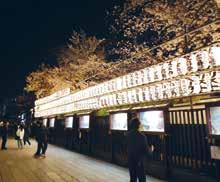
Fast forward to the Dutch and other westerners building relationships with Japan, and the Tokugawa Clan turned
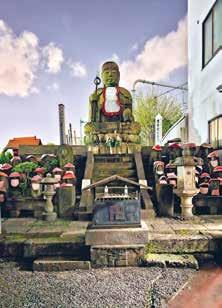
the site into a memorial for those harshly convicted as an effort to distance themselves from this bloodied past. However, history never forgets and after the 2011 tsunami, the Beheading Buddha required renovation as its own head had broken off.


New Orleans is well known for its vibrant nightlife, lively festivals and Creole and Cajun cuisines But, thanks to its tumultuous past, it’s also considered one of the most haunted cities in America. So, with a 32oz Hurricane Slushie in hand, I joined a locally led ghost tour. A Catholic missionary locked away with beautiful vampire schoolgirls, Madame LaLaurie’s murder mansion, voodoo museums and shops were highlights of our route, but my favourite story involves Caesars Superdome Stadium. It’s built on a cemetery site and home to the Saints NFL team. The team had a string of losses, to the extent that fans attended games with bags on their heads to avoid being seen as “Aints” fans. During his 1987 visit, Pope John Paul II was asked to bless the stadium and rid it of its haunted origins.
Perhaps taken in by southern hospitality he agreed. That year the Saints finally won their first championship, 12 years after the stadium was built. Pope Francis I then tweeted his blessing to The Saints in 2019 (an unintentional hashtag mishap) leading to yet another win. Is there something supernatural happening at the Stadium that only the Pope can fend off?
Still alive and kicking, voodoo is Benin’s national religion to this day. The Voodoo Festival is the highlight of the voodoo calendar in Ouidah. On 10th January every year spectators and practitioners gather to celebrate voodoo and its related paths. This high energy festival is top of my travel wish list. Full of drumming, dancing, drinking and of course ritual sacrifice, this is far from your country fair and something you’ll never forget.

If you’ve travelled with Explore and have a story you’d like to share, we’d love to hear from you! Send your story to mystory@ exploreworldwide.com.au
“I’ve never been on a cycling holiday before –I don’t actually cycle outside at home! But I booked this trip spur-of-the-moment and it turned out to be the best holiday of my life. The incredible thing about a cycling holiday is the ever-changing sights, sounds and smells as you’re travelling along. Trying all the different foods our brilliant guide Doan brought us every time we stopped is one of my top highlights. And seeing the lanterns light up Hoi An at night was definitely a ‘pinch-me’ moment. I totally fell for Vietnam – the beauty, the variety of terrain, the culture. I know I could do the trip all over again and love it just as much.”
Taken from Caitlin talking about her recent ‘Cycle Vietnam’ tour.
“Being completely off the grid for seven days felt like a detox for the soul. When you’re above the clouds it’s like you’re detached from the rest of the world and all there is to focus on is the present. I climbed Kili with my daughter, Talia, for her 21st birthday, which was so special. Our entire group were fab. The guides and the porters were incredible too. They ensured everything was taken care of, were amazing support, and they served up some brilliant food! Watching the sunrise at the top was phenomenal –a view I will never forget.”
Ali talking about her ‘Kilimanjaro Lemosho Trek’.

“Ecuador and the Galapagos Islands have been on my bucket list for 20+ years and it’s safe to say they didn’t disappoint! The abundance of wildlife was just incredible. Our tour leader, Diego, really made the trip. I felt so lucky to witness the ‘secret’ Ecuador and Galapagos as he took us to remote villages that most people don’t get to visit. I can’t recommend this tour enough, it was truly magical.”
Cathy talking about her ‘Volcanoes and Galapagos’ trip.
We know our trips are special, but don’t just take our word for it. Explore adventurers are our best ambassadors.



